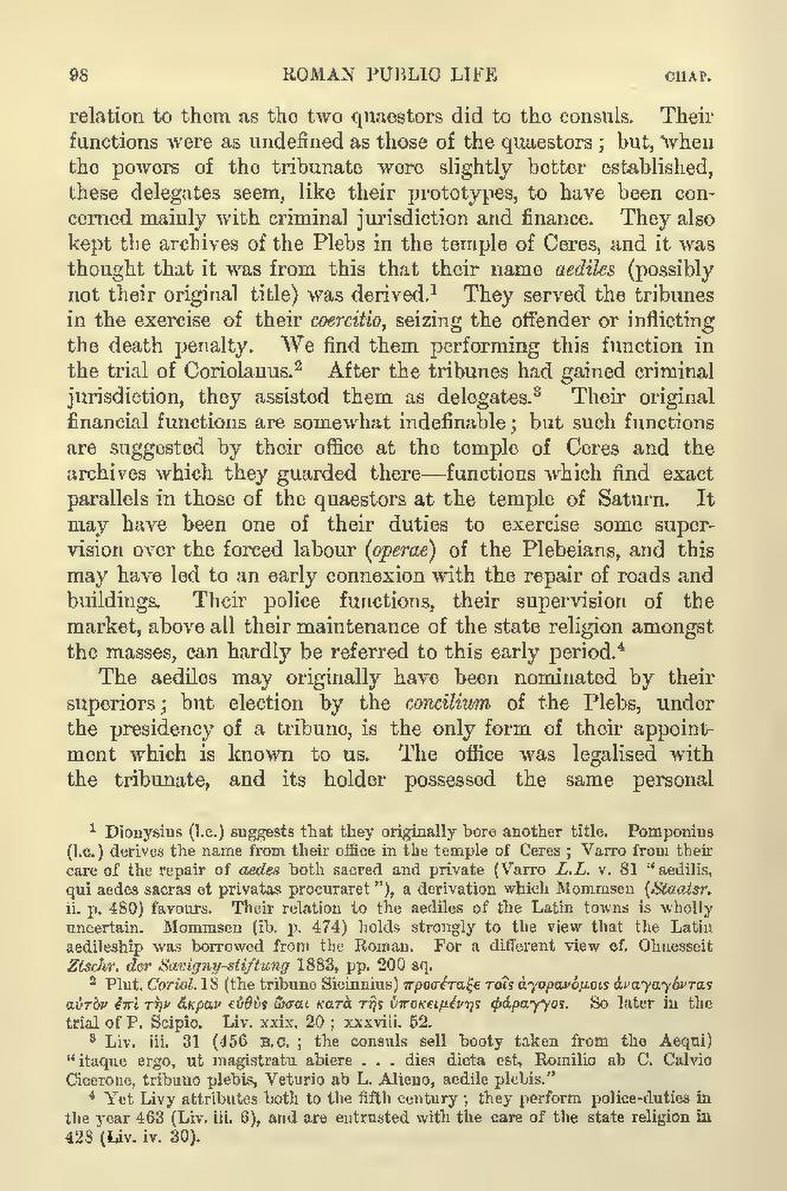relation to them as the two quaestors did to the consuls. Their functions were as undefined as those of the quaestors; but, when the powers of the tribunate were slightly better established, these delegates seem, like their prototypes, to have been concerned mainly with criminal jurisdiction and finance. They also kept the archives of the Plebs in the temple of Ceres, and it was thought that it was from this that their name aediles (possibly not their original title) was derived.[1] They served the tribunes in the exercise of their coercitio, seizing the offender or inflicting the death penalty. We find them performing this function in the trial of Coriolanus.[2] After the tribunes had gained criminal jurisdiction, they assisted them as delegates.[3] Their original financial functions are somewhat indefinable; but such functions are suggested by their office at the temple of Ceres and the archives which they guarded there—functions which find exact parallels in those of the quaestors at the temple of Saturn. It may have been one of their duties to exercise some supervision over the forced labour (operae) of the Plebeians, and this may have led to an early connexion with the repair of roads and buildings. Their police functions, their supervision of the market, above all their maintenance of the state religion amongst the masses, can hardly be referred to this early period.[4]
The aediles may originally have been nominated by their superiors; but election by the concilium of the Plebs, under the presidency of a tribune, is the only form of their appointment which is known to us. The office was legalised with the tribunate, and its holder possessed the same personal. So later in the trial of P. Scipio. Liv. xxix. 20; xxxviii. 52.]
- ↑ Dionysius (l.c.) suggests that they originally bore another title. Pomponius (l.c.) derives the name from their office in the temple of Ceres; Varro from their care of the repair of aedes both sacred and private (Varro L.L. v. 81 "aedilis, qui aedes sacras et privatas procuraret"), a derivation which Mommsen (Staatsr. ii. p. 480) favours. Their relation to the aediles of the Latin towns is wholly uncertain. Mommsen (ib. p. 474) holds strongly to the view that the Latin aedileship was borrowed from the Roman. For a different view cf. Ohnesseit Ztschr. der Savigny-stiftung 1883, pp. 200 sq.
- ↑ Plut. Coriol. 18 (the tribune Sicinnius) [Greek: prosetaxe tois agoranomois anagagontas auton epi tên akran euthys ôsai kata tês hypokeimenês pharangos
- ↑ Liv. iii. 31 (456 B.C.; the consuls sell booty taken from the Aequi) "itaque ergo, ut magistratu abiere . . . dies dicta est, Romilio ab C. Calvio Cicerone, tribuno plebis, Veturio ab L. Alieno, aedile plebis."
- ↑ Yet Livy attributes both to the fifth century; they perform police-duties in the year 463 (Liv. iii. 6), and are entrusted with the care of the state religion in 428 (Liv. iv. 30).
